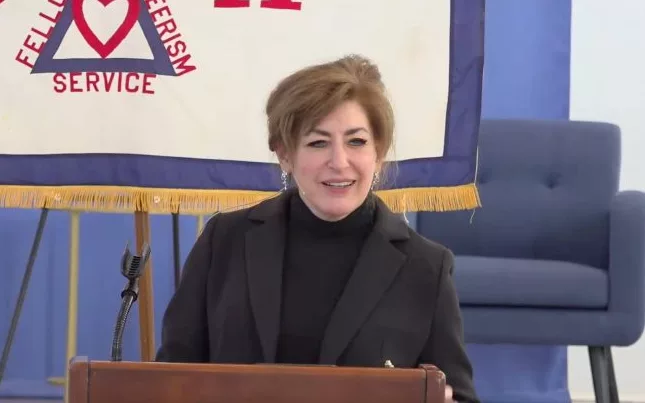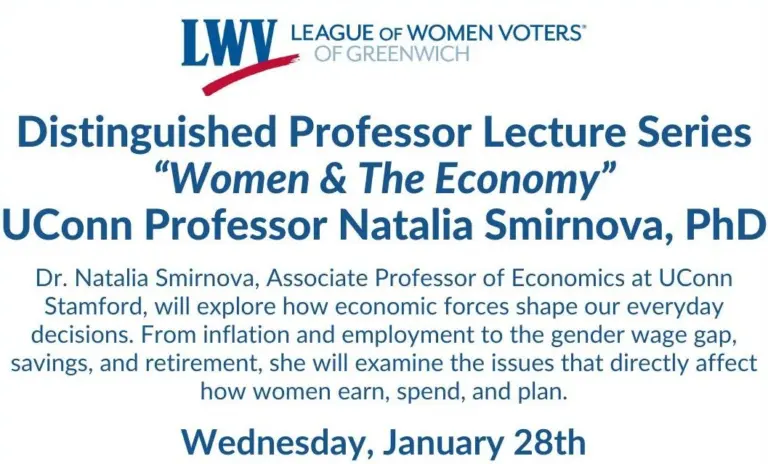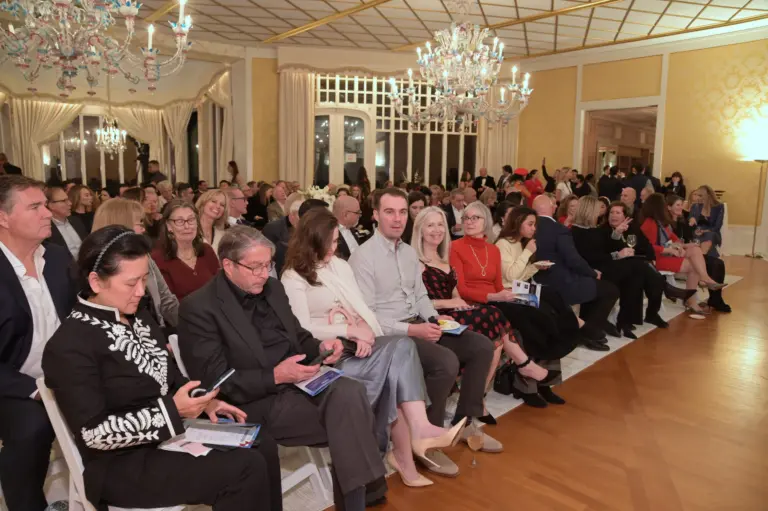
By Fred Wu
At the February 5 meeting of the RMA, Hollister Sturges introduced the distinguished former president of the University of Connecticut, Susan Herbst. Herbst’s presentation, “The Age of Trump: Early Reflections and Predictions for the Second Trump Presidency,” was a thought-provoking lecture on the first couple of weeks of the new Trump administration.
Dr. Herbst began with the observation that the recent election was very close, not a landslide or mandate, with Trump securing 49.8% of the vote compared to Harris’s 48.3%. Herbst framed the current political moment as a series of struggles, many of which date back to the nation’s founding.
The political scientist then delved into several broad observations about the Trump presidency. First, she highlighted the cultural attraction in the United States to authoritarian populism, a phenomenon that has recurred since the late 19th century. Herbst drew parallels to the 1930s, citing figures like Huey Long and Father Coughlin, who, along with FDR, engaged in a struggle over populist appeal. Trump understands better than his predecessors how to become popular and why a strongman figure willing to disrupt the status quo holds such appeal. Trump’s statements about acquiring Greenland, Gaza, and even making Canada the 51st state may be merely distractions or red herrings, but regardless of their feasibility, they serve to reinforce Trump’s image of power and authority.
President Trump has actively promoted the theory of the unitary executive. This theory, rooted in constitutional law, posits that the President has sole authority over the executive branch and advocates for a more expansive interpretation of presidential power. The Trump administration is pushing the limits of this theory, testing whether the executive branch could indeed become the premier branch of government, prevailing over Congress and the courts.
This power-seeking behavior was not anticipated by the Founding Fathers, who had envisioned a system of checks and balances to prevent any single branch from becoming superior. Herbst noted the current docility of the Republican-controlled Congress, which had largely ceded its constitutional independence to the President – a development that would have shocked the founders.
On the issue of tariff powers, Herbst said that these had gradually shifted from Congress to the President starting in the 1930s through to JFK. She emphasized Trump’s unique obsession with tariffs, using them not only as an economic tool but also as a symbolic demonstration of executive power.
Regarding the rule of law, the Trump administration are actively challenging its nature and application. The pardons of January 6th felons are an example of how Trump is using every possible tool within the law to push boundaries. The Constitution states that the President “shall take care that the laws be faithfully executed,” but the administration’s broad interpretation of this clause is another instance of their attempts to expand presidential authority.
The Trump administration has a strategy of simultaneously pushing on multiple fronts, testing the limits of institutions and the rule of law. This approach has left many, including journalists, struggling to keep up with the rapid pace of challenges to established norms. Despite some pushback, these efforts are likely to have lasting effects.
The success of Trump’s brand of populism can be attributed to the enormous change in the media landscape, i.e. the “attention economy.” Experts have underestimated the effects of Trump’s staged reputation from “The Apprentice.” Trump understands that attention is the single, most powerful commodity in our everyday lives. This is one reason why Trump is continuing to hold MAGA rallies; he wants his enemies to fear him and his followers to love him.
Dr. Herbst concluded by showing three images that she feels represent our current political environment. First was an immigration cartoon from 1916 illustrating the longstanding issue “Who is an American?” Since 2015 Trump has kept this question top of mind, largely eliminating the celebration of immigrants, which is very unusual for a US President.
Next, she showed Charles Willson Peale’s “The Artist in His Museum” from 1822. In his time, Peale was an eloquent and influential proponent of the argument that art, science, curiosity, education, and civil debate are not sidelines, but central to what America is. So far, it does not appear that MAGA shares this belief. They are focused on stopping the DEI (Diversity, Equity, and Inclusion) movement, but it is not clear what Trump is trying to replace it with.
The final image was of Grant Wood’s “Parson Weems’ Fable,” 1939. Weems was the skilled propagandist responsible for the tale of George Washington and the cherry tree. Wood’s painting satirizes the myths of Washington’s heroic stature by putting Washington’s adult face onto the figure of the young boy, along with a background of working slaves, which Washington continued to own through his lifetime. Our understanding of the past is always mediated by stories and myths, and Trump himself is a master of mythmaking; he doesn’t need a Parson Weems. He is cultivating his legacy with meme stocks, coins, and sneakers.
In response to audience questions, Dr. Herbst said that Trump is the true “Teflon president.” He gets away with blasting the trade agreements he himself renegotiated with Canada and Mexico in his first term. His current spectacular power grab may become a constitutional crisis if the courts rule against him, but those orders are not enforced.
As the lecture concluded, the audience was left with a sense of the profound changes occurring in American politics under Trump’s second term. Her talk served as both a warning and a call for vigilance, highlighting the ongoing tensions between populist appeal, executive power, and the foundations of American democracy.
The talk can be viewed by going to the RMA website at https://greenwichrma.org, and clicking on “Speakers.”
The RMA’s upcoming presentation, “The Unsightly Truth of Laser Vision Correction: LASIK Surgery Makes Healthy Eyes Sick” by Cynthia J. MacKay, MD, is scheduled for 11 AM on Wednesday, February 19, 2025. Please note that this and all future RMA presentations will be held at Christ Church Greenwich, Parish Hall, 254 E. Putnam Avenue, Greenwich, CT 06830.
Dr. Cynthia MacKay will speak about LASIK surgery, a cosmetic surgical eye procedure. She will outline why patients want the procedure (which is supposed to eliminate the need to wear glasses) and talk about the nature of the procedure (which involves alterations to the cornea). The problem is a high percentage of patients suffer life-altering complications as a result of the surgery – but many patients are not told of the risks prior to consenting to the surgery.
Dr. MacKay is a board-certified ophthalmologist, with comprehensive training in all aspects of eye care, and with special expertise in diseases of the retina and eye laser surgery. She is Clinical Professor of Ophthalmology, Columbia University College of Physicians and Surgeons (Emeritus). Dr. MacKay retired in August 2018 after 40 years of ophthalmology practice in Manhattan. She was the Executive Director of a 2024 film on LASIK, “Broken Eyes”, which has been shown at a number of film festivals and won a number of awards. She also co-authored a book on LASIK which was published in May 2024. On December 6 she was honored at the Annual Westchester County Senior Hall of Fame Awards Luncheon.
Her formal training and education: Harvard University: BA, 1964; State University of New York, Downstate Health Sciences Center Medical School, M.D.1973-1977; Lenox Hill Hospital: Internship in Medicine, 1977-1978; New York Presbyterian Hospital/Columbia University Medical Center: Residency in Ophthalmology, 1978-1981; New York Presbyterian Hospital/Columbia University Medical Center and Bellevue Hospital: Fellowship in Retina, 1981-1982.
To stream the presentation by Dr. Cynthia MacKay at 11 AM on Wednesday, February 19, click on https://bit.ly/30IBj21. This presentation will also be available on local public access TV channels, Verizon FIOS channel 24 and Optimum (Cablevision) channel 79. The public is also invited to attend the presentation in person at Christ Church Greenwich, Parish Hall, 254 E. Putnam Avenue.
Note: The views expressed in these presentations are those of the speakers. They are not intended to represent the views of the RMA or its members.
RMA speaker presentations are presented as a community service at no cost to in-person or Zoom attendees, regardless of gender. Any member of the public who would like to receive a weekly email announcement of future speakers should send a request to members@greenwichrma.org. The RMA urges all eligible individuals to consider becoming a member of our great organization, and thereby enjoy all the available fellowship, volunteer, and community service opportunities which the RMA offers to its members. For further information, go to https://greenwichrma.org/, or contact info@greenwichrma.org.




